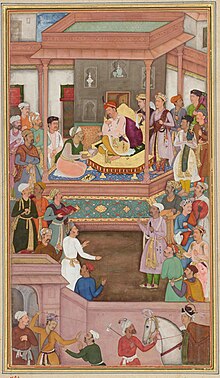Abu 'l-Fazl
Abu 'l-Fazl ibn Mubarak ( Persian ابو الفضل بن مبارك العلاميborn in 1551 ; died August 1602 ) was a chronicler and historiographer in the Indian Mughal Empire , who wrote his works in Persian .
Life
It can be traced back to the Mughal ruler Akbar the Great (1556-1605) since the 1570s , where, for example, he justified the syncretistic Islamic - Hindu religious creation ( din-i ilahi ) of his ruler to Islamic religious scholars. Abu 'l-Fazl's creation in 1574 of a ruling translation agency that translated religious texts from Sanskrit into Persian also had a religious background . Since around 1580 Abu 'l-Fazl was one of the closest advisers to the Mughal ruler, which was probably also reflected in Akbar's new rule ideology.
Abu 'l-Fazl was attacked and murdered in August 1602 by his adversary Selim, the later Mughal Mughal Jahangir , on a trip from the Deccan highlands to Delhi .
Works
Akbar-nāma
From 1589/1590, at Akbar's request, Abu 'l-Fazl wrote a chronicle of the empire ( Akbar-nāma , "The Akbar Book" or "Chronicle of Akbar's Rule"), which duly honored the Padishah and his politics with great rhetorical skill. The work was translated into English by Henry Beveridge.
Āʾīn-i Akbarī
The Āʾīn-i Akbarī ("The provisions made by Akbar") contains in five books called daftar :
- the administration of the Mughal Empire (ministries, offices, factories, etc.),
- Army of the Mughal Empire (soldiers and units, fiefs and benefices, ranks, etc.),
- Time calculation (with approx. 20 different time calculations), geography, history of the Mughal Empire,
- History and customs of the Hindus,
- short autobiography of Abu 'l-Fazl, sayings of Akbar.
The work was first translated into English by Francis Gladwin at the end of the 18th century (three volumes, Calcutta 1783–1784). Heinrich Blochmann later created an edition in two volumes . On this basis, a new English three-volume translation was created, which appeared in Calcutta from 1868-1894 and combined translations by Henry Blochmann and HS Jarrett.
literature
- Stephan Conermann: The Mughal Empire. History and culture of Muslim India (= Beck's series , vol. 2403). Munich 2006, pp. 43, 60 ff., 68-72.
- Saiyid Athar Abbas Rizvi: Religious and Intellectual History of the Muslims in Akbar's Reign: With Special Reference to Abu'l Fazl. Munshiram Manoharlal Publishers Pvt. Ltd., New Delhi 1975.
Individual evidence
- ↑ Akbar-nāma vol. 1 digitized ; Akbar-nāma vol. 2 digitized ; Akbar-nāma Vol. 3 Digitized
- ^ First volume, Calcutta 1783 ( digitized version ); second volume, Calcutta 1784 ( digitized version ); third volume, Calcutta 1784 ( digitized version ).
- ↑ The first volume, published in Calcutta in 1872, contains the first three books in two parts ( digitized part 1 with book 1-2 , digitized part 2 with book 3 ), the second volume, published in Calcutta in 1877, books four and five ( Digitized version ).
- ^ Volume I, translated by H. Blochmann ( digitized version ); Volume II ( digitized version ) and Volume III ( digitized version ), translated by HS Jarrett.
| personal data | |
|---|---|
| SURNAME | Abu 'l-Fazl |
| ALTERNATIVE NAMES | Abu 'l-Fazl ibn Mubarak |
| BRIEF DESCRIPTION | Chronicler and historiographer in the Indian Mughal Empire |
| DATE OF BIRTH | 1551 |
| DATE OF DEATH | August 1602 |
| Place of death | on a trip from the Deccan Highlands to Delhi |
